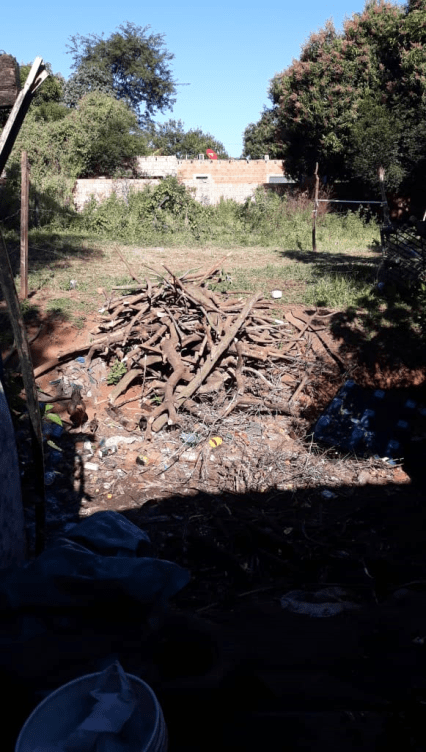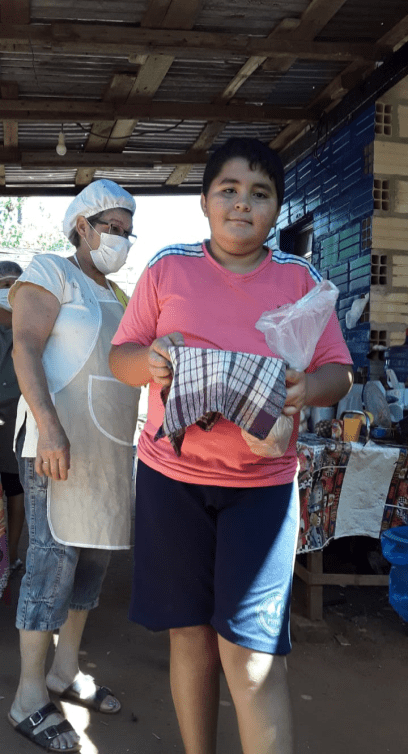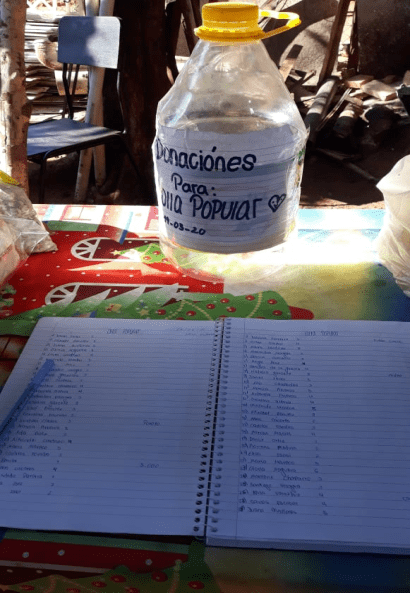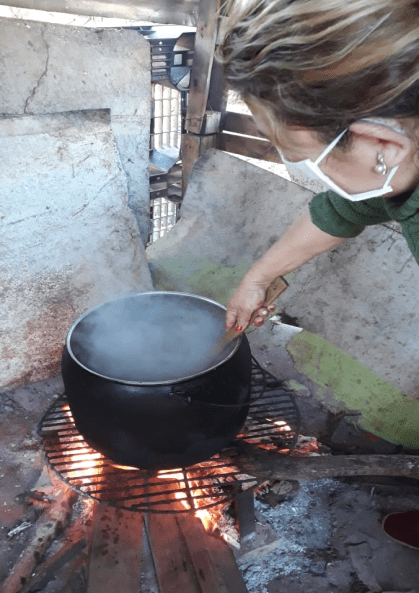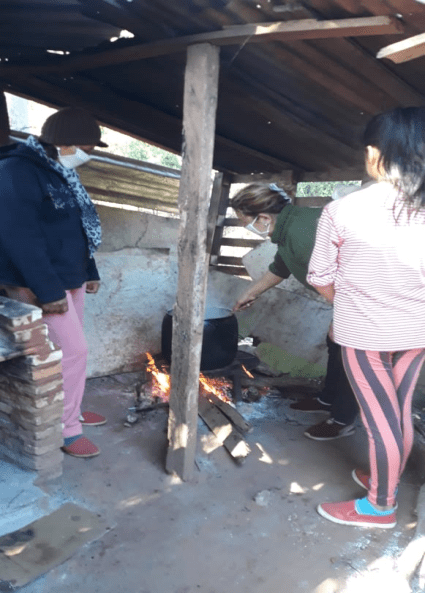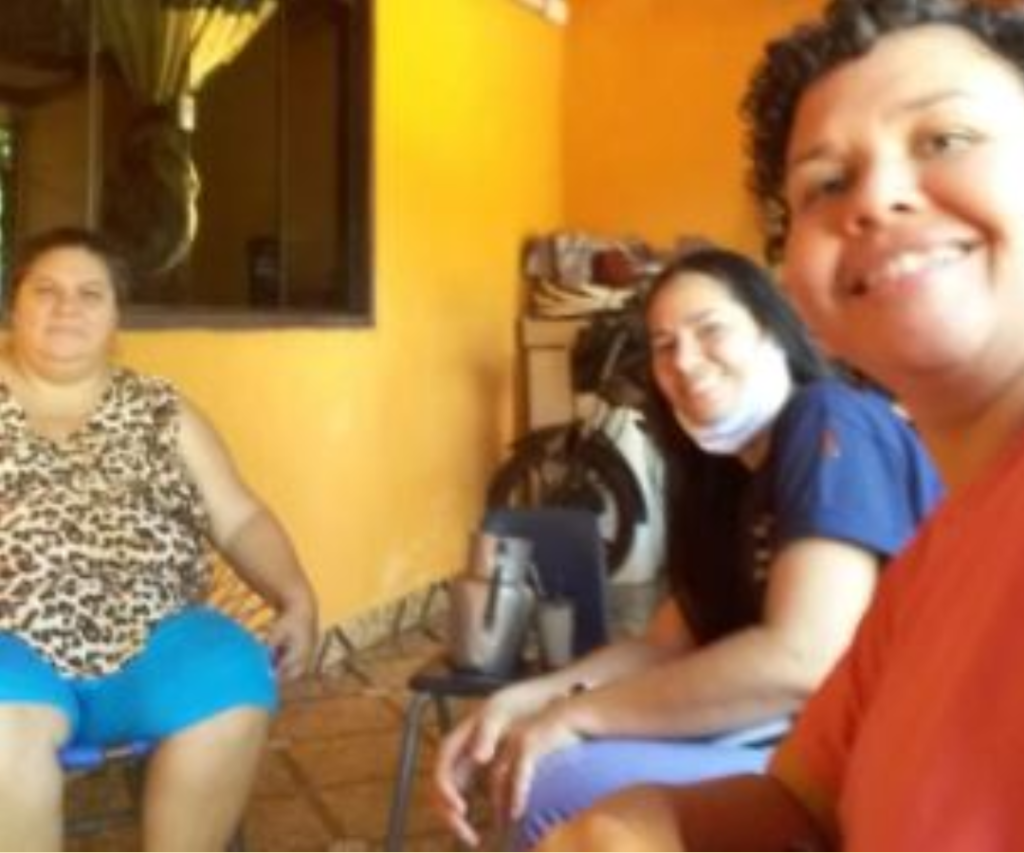
When COVID hit Paraguay, the country’s strict lockdown measures meant that many small businesses suffered, resulting in many families struggling to get enough food to eat each day. As a result, GAiN’s local partners Diaconia and Jesus Responde are running soup kitchens to help.
Margarita R. is a chaplain for Diaconia. She meets with trust groups, specifically to share God’s word, encourage women in the trust groups and pray for them. This was needed more than ever, as a lot of these women were desperate to provide for their families. Below is her story about how she was able to walk alongside a woman who had experienced a series of tragic events.
“I contacted the president of a trust group called San Vincente and asked the leader for permission to visit the soup kitchen so I could pray for her and her family. She accepted without hesitation.
One day, I was visiting a woman named Zunilda and she shared her very painful past. She lost her daughter-in-law in a motorcycle accident, and then three months later, her daughter and her husband also got into an accident, which left her husband fighting for his life. Thankfully, after a long treatment, her daughter recovered completely.
I followed up with Zunilda once a week to pray, encourage her and her family, and share the Word of God with them. The last time that I visited, she told me about a recent tragedy with her nephew. He was hit by a car after chasing a soccer ball that went into the street.
Through text messages, I chatted with her and encouraged her to not distance herself from God, but to rest in Him. I explained how we are able to do this, and every week I continue to pray with her and her daughter. I make sure to continue to share encouraging devotionals with them.
The family was filled with anxious worry about the nephew’s recovery. It’s at times like these that they say they are very thankful for the prayers and support they receive from Diaconia.
I was encouraged when Zunilda told me that she is drawing closer to God again. Thanks to Him, she says, her six-year-old nephew is now much better and has returned home from the hospital.”
Your support has helped provide not just physical nourishment, but emotional and spiritual support for women and families that are struggling during this pandemic. Thank you for helping reveal hope and restore life during these uncertain times. Your help is making a huge impact.
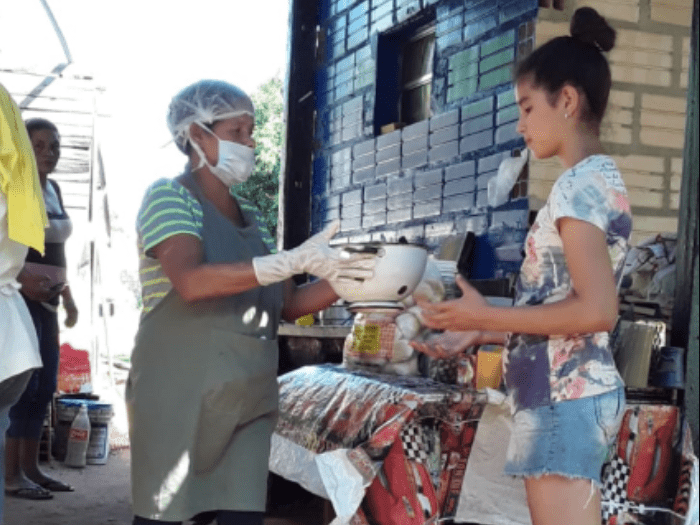
To prevent the spread of COVID-19, the country of Paraguay immediately imposed a strict lockdown and managed to keep their cases low. Unfortunately, this put limitations and restrictions on people’s ability to work, worsening the situation for those already living day-to-day and experiencing food insecurity.
Diaconia, Global Aid Network (GAiN)’s Paraguayan partner, was unable to run trust groups due to a ban on public gatherings. Because of strict curfews and other restrictions, many of their clients’ businesses were impacted.
To help alleviate the stress of food insecurity for their clients’ families and others, Diaconia teamed up with Jesus Responde to run soup kitchens in multiple different communities. There are currently 49 active soup kitchens, reaching over 8,500 people.
Gloria Q., an employee of Diaconia, shared the impact that the soup kitchens are having in the communities, as well as the hearts and sacrifice of the women who are serving.
“I have had the opportunity and great pleasure of being able to spend a morning with several [Diaconia] clients who are running one of the soup kitchens. Having someone visit from the organization brings so much joy to the community and they are always very thankful for the both the material and moral support that they receive from Diaconia.
The women commented happily about their day-to-day experiences cooking for so many people in need. They are in a large squatter village and can’t serve every person but are very thankful to be able to reach so many families.
As they showed me their cooking space, I noticed that they had all of their utensils sanitized and clean and several families had brought firewood so that it would be enough when it came time to cook.
While their cooking space is a bit precarious, the women are not discouraged thanks to their positive attitudes and enthusiasm. They have notebooks where they record the quantity of people that attend every day and a small bank for those who wanted to contribute even the smallest coins to purchase meat for the next day.
Many of them work in recycling and have found themselves out of work temporarily.
Miriam, who is a Diaconía client, and Rosa, who is the owner of the house where they cook, are both Christians and are very grateful for the opportunity to share what God is doing in that place.
Every day, they ask the people attending to form a line where they will retrieve their food and, before serving, they share a Bible verse and pray for the needs that they express at that time.
Now, they don’t even have to ask for prayer requests, the people they serve make sure to remind them that it’s time to pray and most of all they look forward to the time of prayer before the food is served.
Rosa even commented that some people have shown up to leave a small piece of paper that has their prayer requests on the days that the soup kitchen doesn’t serve meals.
These women expressed how God works to not only provide supplies and materials, but also works spiritually and how he can change perspectives and mindsets when families hear His Word. Some, maybe only a few, but not any less important, are conscious that if they have even something small to eat at home, they don’t attend the soup kitchen so that those who need it most are able to eat, despite not having enough for themselves.
Some days, they play games and sing Christian songs with the children that come. If they show up early and the food isn’t ready yet, they take advantage of the time to have some fun with the younger kids. And then, after the meal, they go home even more joyful.
After spending a wonderful morning with the women of this soup kitchen, we had a time of prayer—thanking God for His mercy, asking Him to keep transforming hearts through this activity, and for taking care of each person who is exposed daily to COVID-19.
This was such a beautiful experience for me and filled me with such a feeling of satisfaction and, more importantly, joy. I thank God for each one of the women working in the soup kitchens that each and every day are willing and ready to serve their community without expecting anything in return.”
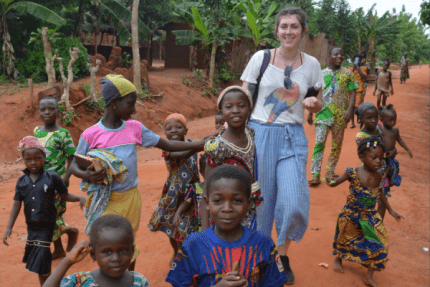
After spending a week in Benin on a LIFE Team Vision Trip with Global Aid Network (GAiN), Rachel Botma had visited enough villages to see the contrast between communities with access to clean water and those without.
“Just to see the enormous impact that having clean water has on a community was really something. You could really tell the difference between the communities with and without. Not just wells, but churches, too. There seemed to be so much more life, joy and vigour at the minimum.”
It was back in March 2019 that Rachel, along with her mother and four other team members, joined GAiN to Benin to see the work that is being done on the field through the Water for Life Initiative program.
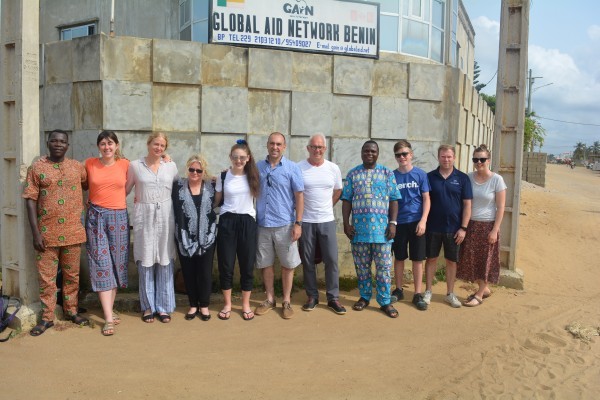
“I have been wanting to get involved in some kind of humanitarian project or volunteer for an NGO for quite a while but never found the right opportunity for me,” Rachel, explained. “Clean water and access to clean water is something that is near and dear to me; something I have been quite passionate about for some time. When I heard about the work that GAiN was doing, [providing] wells for underserved communities and villages, it was something that I knew I wanted to get involved with.”
With this being her first ever trip to Africa, and first trip to a developing country, Rachel signed up with no expectations. She quickly found herself shocked, but says it was a necessary shock.
“We pretty much jumped right into seeing the villages, which I think was really great because it jump-started a lot of powerful conversations and a lot of brainstorming. It was really wonderful for me to pick the brains and hear others pick the brains of some movers and shakers in the humanitarian space. It was quite inspirational for me.”
She recalled the first village they visited, Guede Codji, which was the first village to receive a deep-capped water well from GAiN in 2005.

The team learned about how a lack of clean water exacerbates gender inequality in places like Benin, where women and girls have to give up educational and career opportunities because they are tasked with fetching water for the family. In places where a water source is a few kilometres away, women are often put in danger situations must risk their safety to get water that is contaminated.
“Often these women get sexually assaulted on their journeys for water. That to me was such a horrible reality because they don’t have a choice and they have to put themselves in jeopardy every single day.”
An encounter with a local teenage girl and her father really stuck with her and highlighted the gender inequality issue even more.
“Another conversation that really stood out to me as a huge cultural issue is just how much the girls are expected to work, and how the men just don’t see a problem with it. The most extreme situation we saw was with this 16 year-old girl, Clarice, and her father. When I first saw Clarice, I said to my mother, ‘Wow, that young girl must be nine months pregnant with twins.’ Turns out, she has sclerosis of the liver.”
There was another team member on the trip, named Abel, who happened to be a doctor and was able to talk to Clarice’s father about her medical history. It was her second time developing the condition. Abel advised Clarice to take it easy, telling her father not to let her carry anything heavy and to send her to a doctor. While Clarice and her father seemed to understand and agree, Rachel was very disappointed when she saw that not more than 15 minutes later, Clarice was carrying large pails of water over her head as her father watched on his bicycle.
“The point of this story is to show just what a woman or girl must endure without say, the expectations of them, their lack of rights, and also dignity,” Rachel explained.
Not only did Rachel witness gender inequality in the field, she also saw what the reality was like for villages without a clean water source versus villages with wells.
“One thing that really struck home for me was seeing the water source of one of the villages, which they called a river but was nothing more than a stagnant swamp — smell included. During our time there, we got to see a well constructed and become operational for that village. [It’s] crazy to think [that] what we take for granted, something as simple as water, can have such a huge impact.”
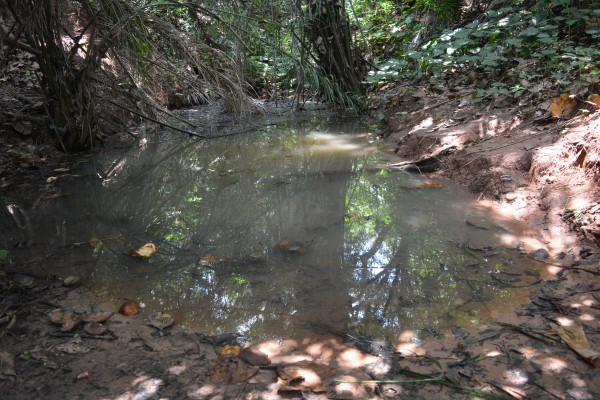
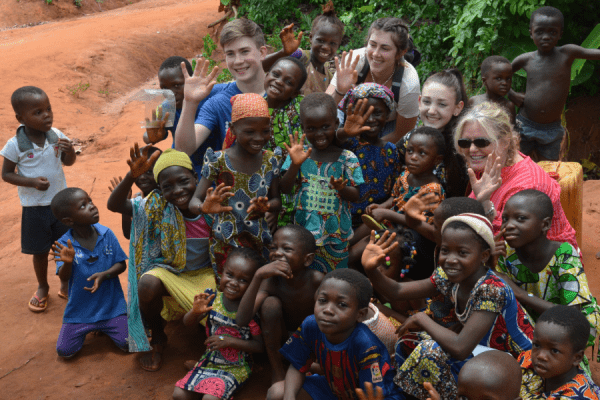
She observed that the impact of clean water was truly evident in the joy of the children.
“I noticed in the communities that had [deep-capped water] wells, the children were acting like children. They were silly and playful like children should be. In the villages without wells, and especially in the villages with a lot of voodoo (which you could really feel a dark, heavy spirit), the children seemed so lifeless. No emotion; no reaction to anything. I mean, comparing the two is almost a day and night difference.”
Although it was only a little over a week long, the trip provided Rachel with multiple learning opportunities, whether it was through speaking with villagers or GAiN staff from Canada or Benin.
“It was really encouraging to meet the GAiN staff. I mean, you could feel the blessing in the GAiN house, radiating off of the staff.”
The first full day consisted of a staff meeting, giving the team an opportunity to meet most of the staff, hear their testimonies and learn about the work that they do. They had the opportunity to dance and sing together and hear a message from Patrice Lavagnon, GAiN Benin country manager, and Ray Sawatsky, GAiN’s CEO and Executive Director.
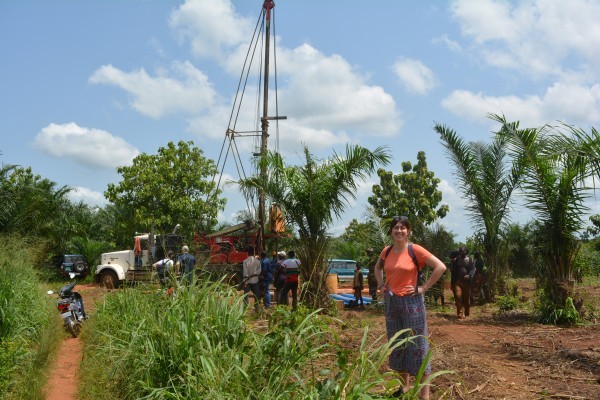

“We were able to see the community that has been built around GAiN. It was a wonderful experience. One that I had never been a part of before; non-traditional worship, and feeling its impact. It was a blessing for me to be a part of that and I am very thankful.”
And the vision trip was just the start of Rachel’s involvement with GAiN, as she hopes to stay involved in the future.
“I am interested in hearing about more opportunities for me to continue involvement whether it could be to go on another vision trip, volunteering or even employment. It is a smart organization, and one with the values that I can stand behind.”
ARE YOU INTERESTED IN GOING ON A LIFE TEAM VISION TRIP? CHECK OUT OUR UPCOMING LIFE TEAM VISION TRIP DATES.
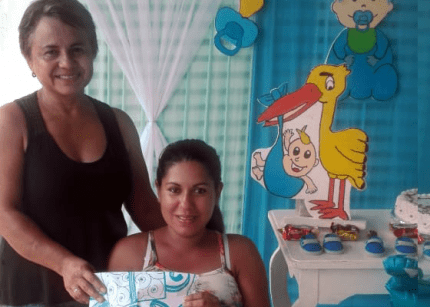
Mercedes is a woman of many talents. While her main business is selling clothing in her neighborhood, she also makes a variety of traditional Paraguayan foods to sell. Her two children are now grown, but are still living at home and their whole family depends on the income Mercedes generates with her business.
Creating a new income source was the initial reason that Mercedes became an entrepreneur, however, she has a deeper motivation for choosing to sell clothing. “Something I’ve always taught my children is that they should try to dress well,” she said. “It doesn’t matter if you’re rich or poor, you should always try and you deserve the opportunity to dress well.” She also commented that when she does business, she’s not only selling clothes, she’s selling hope to the people in her neighborhood.
Seven years ago, Global Aid Network (GAiN)’s Paraguayan partner, Diaconía gave her the initial push she needed to get her business started. She says that Diaconía has helped her to look further than her current situation and to hope for more. “Diaconía gives us the support we need. The women in my community have a lot of potential, but we need a push and training on how to start a business. Diaconía has been a huge help.”
Mercedes has also learned how to always have a goal in mind, and she is working to one day have her own shop to sell clothes and also make healthy meals to-go. Many of her neighbours work full time and don’t have enough time to sit and have a healthy meal at lunch time. Her dream is to create a menu with healthy options that her neighbors can purchase and take with them on busy days.
Over the years, Mercedes’ trust group has grown together and learned to support and celebrate one another. They even take advantage of their meeting times to have birthday parties, baby showers and fundraisers for group members in need.
WOULD YOU LIKE TO PROVIDE A MICRO-LOAN TO A WOMAN LIKE MERCEDES?
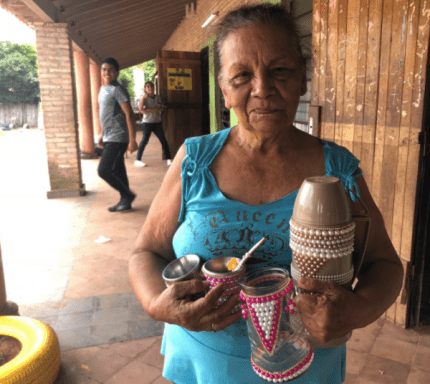
When Benita found out she was sick and began to grow weaker, she could no longer clean houses for a living. She began to sell traditional Paraguayan foods from her home but was just barely making it on the small income she was earning. At the beginning of 2018, she heard of the vocational training courses through Diaconía, Global Aid Network (GAiN)’s partner in Paraguay, and joined right away. Diaconia offers vocational training for impoverished women who are interested in establishing or growing a small business. Throughout the year, there are a variety of different classes for women who are interested in learning how to sew, craft, do hair and makeup and more. Since Benita started attending a vocational training, she has never missed a meeting since.
Throughout the year, she has learned to crochet, embroider cloth purses, decorate sandals and thermoses, and work with beads to make jewelry. Now, in addition to selling food, she takes personal orders for her craft work and sells her products in her community. She has always loved creating things but wasn’t able to allow her creativity to flourish because there wasn’t anyone to teach these trades. With the skills she learned in the courses, she now loves what she does, and the additional income helps her to advance more in life.
She is thankful for what Diaconía and God have done in her life and community. Because of this experience, her neighbourhood is improving economically and is more united. What she has learned and accomplished has created a sense of pride in her own work and has taught her that she can always learn new things.
DO YOU WANT TO HELP WOMEN LIKE BENITA BY GIVING THE OPPORTUNITY TO LEARN NEW SKILLS THROUGH VOCATIONAL TRAINING? YOU CAN HELP WOMEN IN PARAGUAY BREAK THE CYCLE OF POVERTY.
GIVE TODAY
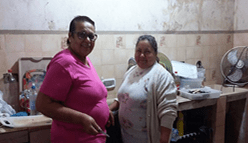
Mrs. Clotilde Haedo (pictured on the right), 57 years old, is a hardworking mother of seven, currently living with two of her kids in Isla Bogado, Paraguay, in the neighborhood of Luque. She has faithfully attended the National Marathon of Prayer, an event organized annually by Global Aid Network (GAiN)’s Paraguayan partner Jesús Responde, since 2010.
In August 2012, a young volunteer from Jesús Responde met with Clotilde and shared stories of impact from the Jesús Responde wholistic community centres and invited Clotilde to partner with them as a donor. She accepted the invitation and committed to giving 20,000 Guaranies ($4.36 CAD).
True to her word, Clotilde gave the agreed amount each month.
Unfortunately, as time passed, her family experienced a financial crisis, causing her to, with great sorrow in her heart, renounce the commitment that she had made.
In September 2017, the pastor, of Clotilde’s church, Pastor Cleibel Peixoto, challenged the members of his congregation to start a wholistic community centre. Although she was hesitant at first, Clotilde agreed to be one of the cooks. In that moment, she remembered the commitment she had made and could not fulfill years ago. Clotilde saw this as a new opportunity that came from God. He was calling her once again to serve.
By the end of 2017, the wholistic community centres had served the community successfully and the number of children in attendance increased. Upon hearing this, a representative of Jesús Responde en Luque told them of the support given to the churches that work with children.
On February 13, 2018, Pastor Cleibel presented his application and shortly thereafter began to work in partnership with the institution.
On June 3 of that same year, Mrs. Clotilde confirmed during a volunteer day, once again, the call for her life. “I thank God for showing me, after thirty years (in the way of the Lord), the ministry that He had kept for me,” she told us, with tears in her eyes.
Today she serves with joy and faithfulness at the community centre, loving and caring for the children. The children have praised her, saying that they do not even eat a meal made with as much affection in their homes.
YOU CAN HELP BRING WHOLISTIC NUTRITION TO IMPOVERISHED CHILDREN IN PARAGUAY. WILL YOU HELP SUPPORT A WHOLISTIC COMMUNITY CENTRE?
GIVE TODAY
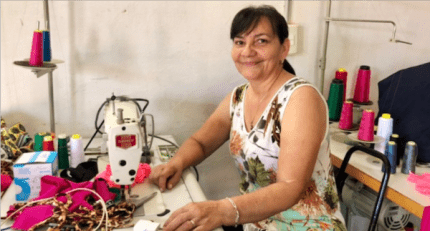
Fifteen years ago, Rosalina knew her life was about to drastically change. When her youngest son was born with mental disabilities, she immediately searched for a way to work from home. She had been working in a clothing factory for years and had sufficient experience in clothing design and fabrication to open her own home workshop in her home. She began to specialize in bathing suits and started to sell them to large retail companies in her city.
Now, her three older children work with her, along with one other hired employee. Two of her children have their own workshops as well, and one has been certified from a design institute. She says her youngest knows how to work all the machines and likes being involved, but he’s still too young to legally work alongside the rest of the family.
Thanks to Diaconia, Global Aid Network (GAiN)’s partner in Paraguay, Rosalina was able to receive micro-loans to help grow her business. Diaconia helps impoverished women by offering financial training, vocational training and micro-loans to assist in the start up and growth of a small business.
Rosalina used the loans she received to buy new fabrics and accessories to make more bathing suits. She is currently in the process of launching her new line of suits for children and babies. Her goal for this season is to increase sales and hire someone to market and sell her specific brand. She wants to have her own store instead of selling her products to larger companies. Her other goals are to provide further training for her children and to purchase a printing press to put more designs on the fabrics. As a single mother, Rosalina has not only provided for her family, she has taught her children how to work hard, run a business, and persevere until you succeed.
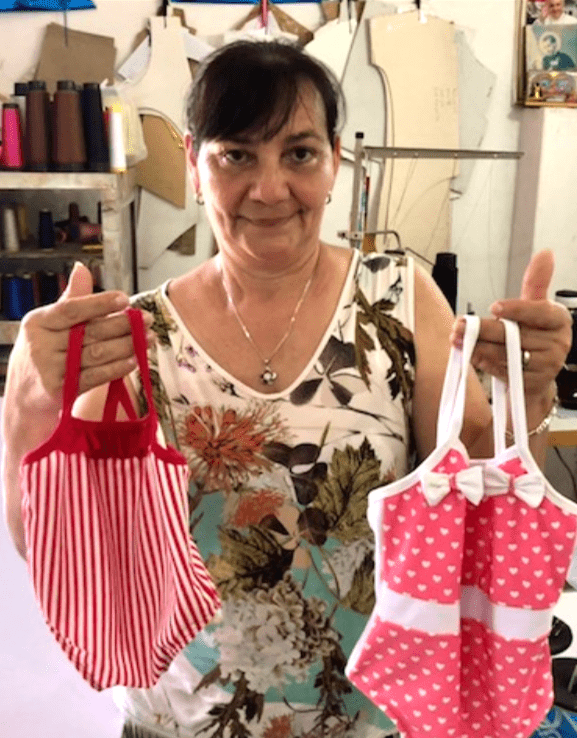
YOU CAN HELP WOMEN LIKE ROSALINA BY PROVIDING A MICRO-LOAN TO HELP HER START HER OWN BUSINESS. WILL YOU GIVE TO HELP BREAK THE CYCLE OF POVERTY IN PARAGUAY?
GIVE TODAY
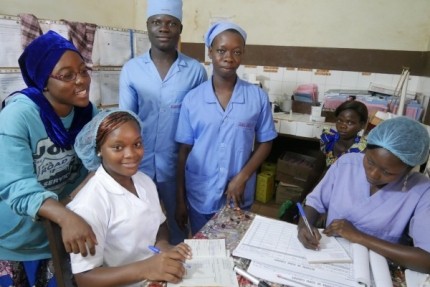
“The gender training has had a huge impact on our households,” one woman from the village of Fignonhou, Benin, told us after we had conducted a gender sensitivity training in her community. “There was a lot of quarrelling between husbands and wives before. Now, few people quarrel. Violence against women has decreased.”
When another woman first went to a hygiene and sanitation training put on by GAiN [as part of the Maternal Newborn Child Health (MNCH) project, in partnership with the Government of Canada] her husband was angry with her for going without his permission. However, when he noticed the useful information she was learning and how it improved their lives, he was happy to see her participate in more training and activities.
Sometimes it is these small improvements in women’s lives that give hope. When before, women were devalued and forbidden to take action and responsibility, now, they are now trusted and empowered to create change. They are given a new status within their homes and communities.
This year for International Development Week (IDW), the theme is “Together for Gender Equality.” Through our projects, one way that we aim to restore justice is by addressing gender inequality in the developing countries in which we work.
After 13 years of providing deep-capped water wells in remote areas, we’ve seen the power that clean water has to transform individuals and entire villages – not only to improve health but also the quality of life for women.
Over the last two years, we’ve been able to help mothers and children through the MNCH project by:
- Providing water wells in the village near medical clinics. This not only reduces diseases but also eases the burden of time and physical demands for women and girls, allowing them to attend school, focus on the needs of their families and other economic activities.
- Providing hygiene and sanitation education, as well as handwashing stations.
- Equipping village champions with the tools to promote proper hygiene and community health.
- Improving local health services by providing clinic trainings for village health workers to improve their skills.
- Empowering women through gender sensitivity training for both men and women. The goal is to foster healthy family relationships and ensure that the rights of women are better understood and respected, as their participation in decision making and control of resources is valued.
Learn more and see how you can join us in becoming change-makers in advancing gender equality in countries like Benin and Togo.
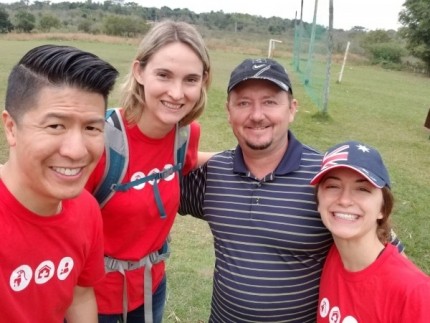
Alex P., Paraguay LIFE Team Participant, shares his experience below.
I was expecting to simply do some business workshops and that was it – but God had greater plans.
I felt called to do missions when I was a teenager but never acted upon it. Life got in the way – going to school, finding a job, getting married, buying a house, having kids, etc.
One Sunday, the pastor of my church had a sermon about “rekindling lost dreams” and, immediately, I thought about missions.
When I came across Global Aid Network (GAiN)’s booth at Missions Fest in January 2018, they really got my attention. I searched through the LIFE Team trips and saw that the Paraguay trip needed volunteers with a business background to teach on financial literacy, which is sort of what I already do in my profession! This was a sign that God was calling me there.
So, I went on the trip to Paraguay to serve with Diaconia (GAiN’s in-country partner that provides micro-loans to help women get out of the cycle of poverty). There, I did workshops on financial literacy, how to start a business and managing personal finances.
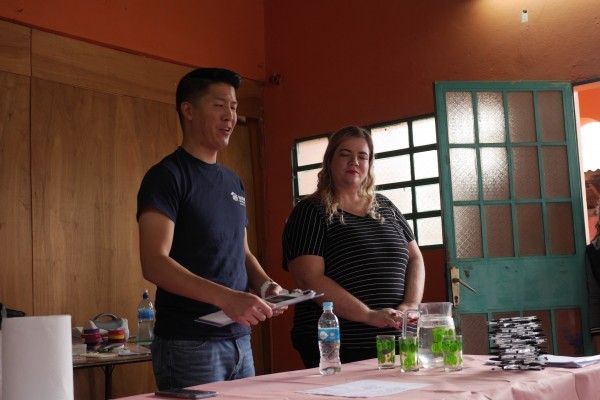
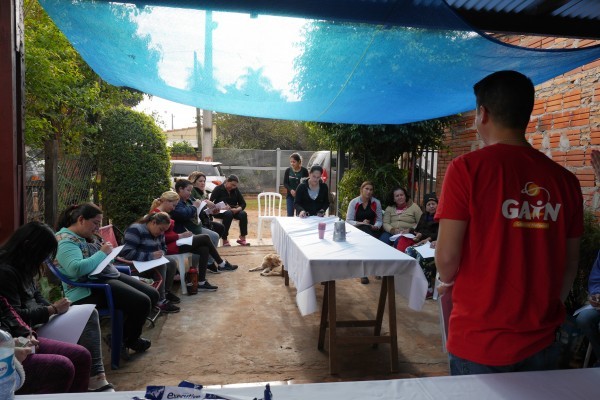
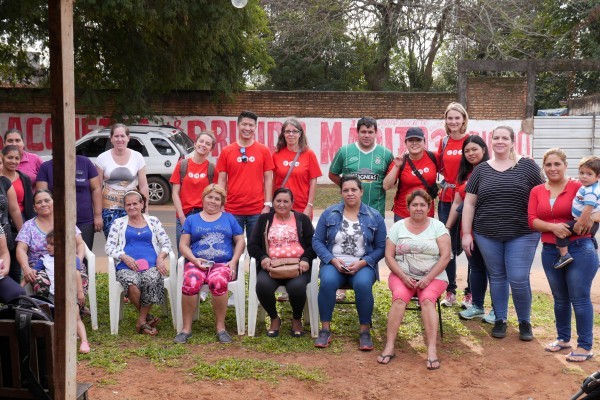
We also visited several Diaconia Trust Groups – groups of about 15 people, who receive a group loan and help hold each other accountable to pay back their loans. Then we visited some of the local businesses of Diaconia clients. We got to see how the micro-loan program has impacted their lives.
Near the end of our week, we visited Jesus Responde (Global Aid Network’s other partner in Paraguay) and went to a wholistic community centre that partnered with a church to do AWANA Children’s Ministry and spent the day with the children and staff there.
In the middle of the week, I also had an opportunity to lead a devotional for the Diaconia staff. I tried to keep an open mind to whatever God had in store for me. I was busy preparing the business presentations leading up to the trip, so I didn’t have too much time to meditate on it beforehand. I was expecting to simply do some business workshops and that was it – but God had greater plans.
The devotional that I shared with the Diaconia staff was something I didn’t prepare beforehand, perhaps only 30 minutes the night before. After several conversations with the local staff at Diaconia, it became apparent to me that because of the history with the Triple Alliance War and how it has affected the culture in Paraguay, the family unit is broken.
With the current culture in Paraguay right now, it generally accepted as normal for men to not be involved in family life, even being unfaithful to their wives. Some men are not present, leaving the burden to raise families to the women.
I felt that God called me to direct my devotional toward the men, talking about the importance of prioritizing family as a husband and father.
The staff at Diaconia really thanked me for speaking on the topic (even the women too). One lady said to me that no one has ever spoken on that topic like that before, and the men really needed to hear it.
There was great fruit from my devotional, as it even sparked more conversation with our missions team throughout the week! My initial intention was just to direct the devotion towards the men, but God multiplied the fruit by also blessing the women!
I feel that I showed God’s love by serving the people through financial literacy workshops, leading a devotional, listening to people’s stories and speaking into their lives, and spending time with the kids at the community centre.
What impacted me the most was listening to people’s stories about how God has changed their lives through Diaconia, Jesus Responde and the local church. As long as we get out of our own way and say yes to God, He will open up doors and bless you abundantly.
I hope that sharing my experience with my family and friends will inspire them to also serve locally or abroad. I am most definitely thinking of going back! I’ve already made plans to return next year, and in the meantime, starting to learn Spanish.
If you want to go on a mission trip, do it! There is never going to be a perfect time to go. Life will get in the way and you can make up hundreds of excuses not to do it, but if you feel called don’t ignore it. Say yes to Him and He will take care of the rest. You will be glad you did. You may even think “why didn’t I do this sooner?” You will be blessed greater than you can imagine!
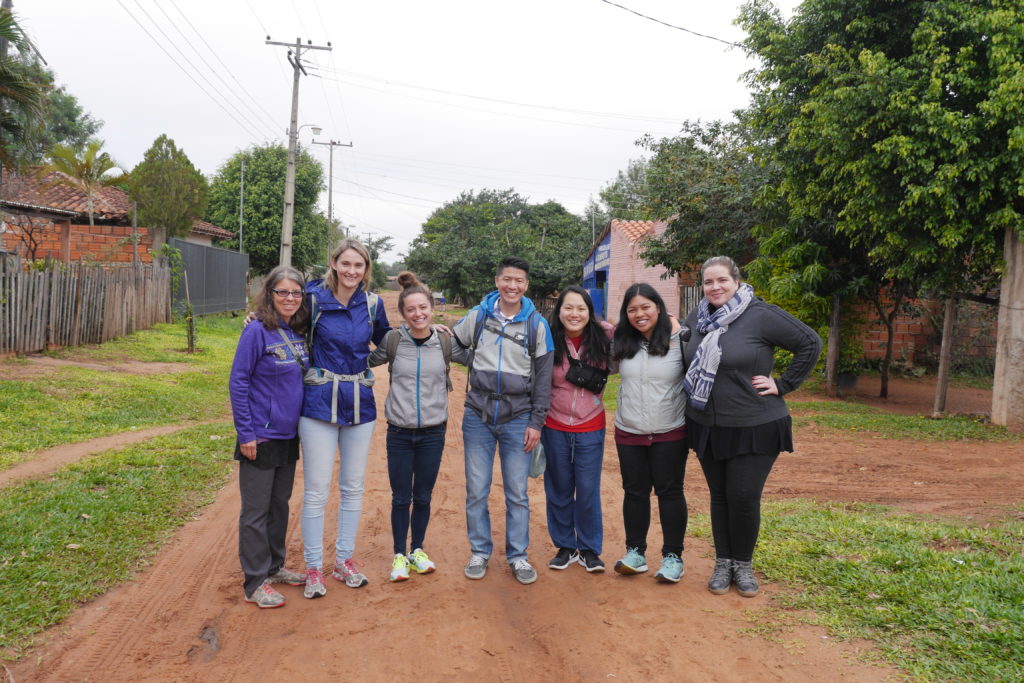
JOIN A LIFE TEAM TRIP TO PARAGUAY THIS YEAR!
I’M INTERESTED
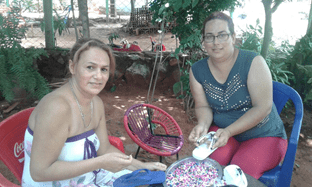
In the city of San Antonio, Paraguay, resident Maria Liz meets regularly with a group of women – all budding or aspiring entrepreneurs. This group is one of many trust groups formed through Diaconia, Global Aid Network’s in-country partner in Paraguay that provides micro-loans and business training to poverty-stricken women. As recipients of micro-loans, these women gather weekly to encourage and hold each other financially accountable to repay their loans.
This particular group calls themselves Valuable Women.
“I heard about Diaconia through a radio station and called their office and that was how, together with a group of women from my neighbourhood, we were able to receive microloans,” said Maria. “We heard about the vocational trainings offered and I immediately took the opportunity.”
Maria attended a crafts workshop, learning specifically how to make embroidered slippers.
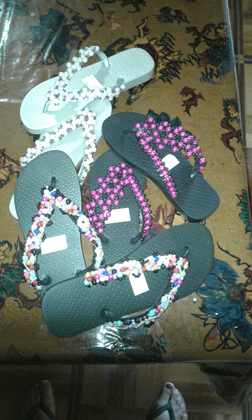
“I learned a lot. It gave me a solid income and I have sold a lot of these slippers since then. I am so grateful to Diaconia for creating a place for opportunity and growth for me and many other women in my community.”
Would you like to help a woman like Maria start her own business? Your one-time or monthly gift can impact multiple women over time!

